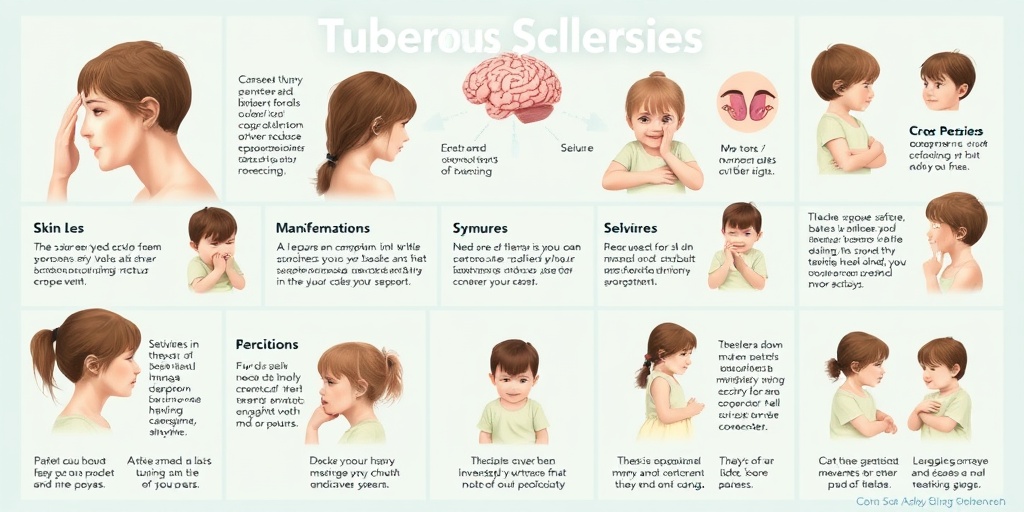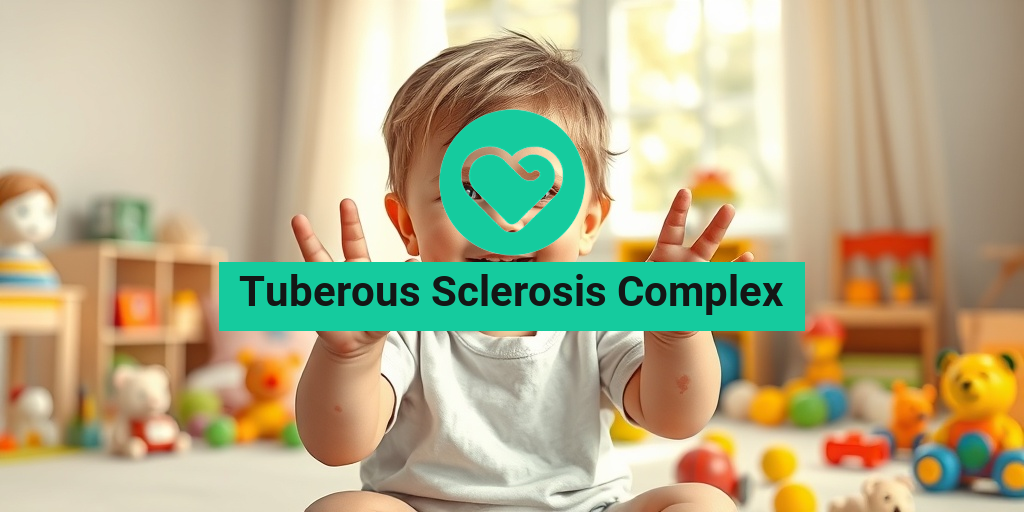What Is Tuberous Sclerosis?
Tuberous Sclerosis Complex (TSC) is a rare genetic disorder that affects multiple systems in the body. It is characterized by the growth of non-cancerous tumors, known as hamartomas, in various organs, including the brain, skin, kidneys, and heart. These tumors can lead to a variety of health issues, making early diagnosis and management crucial.
Understanding the Genetics of Tuberous Sclerosis
TSC is caused by mutations in either the TSC1 or TSC2 genes, which are responsible for regulating cell growth and division. When these genes are mutated, it can lead to uncontrolled cell growth, resulting in the formation of tumors. The condition follows an autosomal dominant inheritance pattern, meaning that only one copy of the mutated gene from either parent can cause the disorder.
How Common Is Tuberous Sclerosis?
Tuberous Sclerosis Complex affects approximately 1 in 6,000 individuals worldwide. It can occur in people of all ethnic backgrounds and is often diagnosed in childhood, although some cases may go undetected until adulthood. Awareness of TSC is essential for timely intervention and support.
Tuberous Sclerosis Symptoms
The symptoms of Tuberous Sclerosis Complex can vary widely from person to person, depending on the organs affected and the severity of the condition. Some individuals may experience mild symptoms, while others may face significant challenges. Here are some common symptoms associated with TSC:
Neurological Symptoms
- Seizures: One of the most common symptoms, affecting around 80% of individuals with TSC. Seizures can vary in type and severity.
- Developmental Delays: Many children with TSC may experience delays in reaching developmental milestones, including speech and motor skills.
- Behavioral Issues: Some individuals may face challenges such as autism spectrum disorders, attention deficit hyperactivity disorder (ADHD), or other behavioral concerns.
Skin Symptoms
- Facial Angiofibromas: These are small, reddish-brown bumps that typically appear on the face, particularly on the nose and cheeks.
- Hypomelanotic Macules: Light-colored patches on the skin that can vary in size and shape.
- Shagreen Patches: Thickened, dimpled skin that often appears on the lower back.
Kidney Symptoms
- Renal Angiomyolipomas: These are benign tumors that can develop in the kidneys, potentially leading to complications such as bleeding or kidney dysfunction.
- Cysts: Fluid-filled sacs that can form in the kidneys, often requiring monitoring.
Other Symptoms
- Cardiac Rhabdomyomas: These are benign tumors that can occur in the heart, often detected during infancy.
- Lung Issues: Some individuals may develop lymphangioleiomyomatosis (LAM), a rare lung disease that can cause breathing difficulties.
When to Seek Medical Advice
If you or a loved one is experiencing symptoms associated with Tuberous Sclerosis Complex, it is essential to consult a healthcare professional. Early diagnosis and intervention can significantly improve outcomes and quality of life. Regular monitoring and a multidisciplinary approach to treatment are often necessary to manage the various aspects of TSC effectively.
For more information and resources on Tuberous Sclerosis Complex, consider visiting Yesil Health AI, where you can find evidence-based health answers tailored to your needs.
In conclusion, understanding Tuberous Sclerosis Complex and its symptoms is vital for those affected and their families. With proper management and support, individuals with TSC can lead fulfilling lives. 🌟

Tuberous Sclerosis Causes
Tuberous Sclerosis Complex (TSC) is a rare genetic disorder that can affect multiple systems in the body. Understanding the causes of TSC is crucial for early diagnosis and management. Let’s delve into the primary causes and risk factors associated with this condition.
Genetic Mutations
The primary cause of Tuberous Sclerosis Complex is mutations in specific genes. The two main genes involved are TSC1 and TSC2. These genes are responsible for producing proteins that help regulate cell growth and division. When mutations occur, it can lead to the formation of benign tumors in various organs, including the brain, kidneys, heart, and skin.
Inheritance Patterns
TSC can be inherited in an autosomal dominant pattern, meaning that only one copy of the mutated gene from an affected parent can cause the disorder in their child. However, in some cases, TSC can occur sporadically due to new mutations, which means it can appear in families without a prior history of the condition.
Environmental Factors
While TSC is primarily genetic, some studies suggest that environmental factors may play a role in the severity and manifestation of the disease. Factors such as prenatal exposure to certain medications or infections during pregnancy could potentially influence the development of TSC in genetically predisposed individuals.
Risk Factors
Several risk factors may increase the likelihood of developing Tuberous Sclerosis Complex:
- Family History: A family history of TSC increases the risk of inheriting the condition.
- Gender: Both males and females can be affected, but some studies suggest that males may experience more severe symptoms.
- Age: Symptoms often manifest in early childhood, but they can also appear later in life.
Tuberous Sclerosis Diagnosis
Diagnosing Tuberous Sclerosis Complex can be challenging due to the variability of symptoms and their overlap with other conditions. However, early diagnosis is essential for effective management and treatment. Here’s how healthcare professionals typically diagnose TSC.
Clinical Criteria
The diagnosis of TSC is often based on clinical criteria established by the International Tuberous Sclerosis Consortium. These criteria include:
- Presence of Tumors: The identification of characteristic tumors, such as hamartomas in the skin, brain, and other organs.
- Neurological Symptoms: Seizures, developmental delays, and behavioral issues may indicate TSC.
- Skin Manifestations: Skin lesions like ash-leaf spots, facial angiofibromas, and shagreen patches are common indicators.
Imaging Studies
Imaging studies play a crucial role in diagnosing Tuberous Sclerosis Complex. Common imaging techniques include:
- Magnetic Resonance Imaging (MRI): MRI scans are used to detect brain tumors and other abnormalities associated with TSC.
- Ultrasound: This is often used to assess kidney tumors and other organ involvement.
- X-rays: X-rays may help identify bone lesions related to TSC.
Genetic Testing
Genetic testing can confirm the diagnosis of Tuberous Sclerosis Complex by identifying mutations in the TSC1 or TSC2 genes. This testing is particularly useful in cases where clinical symptoms are ambiguous or when there is a family history of the disorder.
Multidisciplinary Approach
Diagnosing TSC often requires a multidisciplinary approach, involving specialists such as neurologists, dermatologists, and geneticists. This collaborative effort ensures a comprehensive evaluation of the patient’s condition and the development of an effective management plan.
In conclusion, understanding the causes and diagnostic criteria for Tuberous Sclerosis Complex is vital for timely intervention and support. If you suspect TSC or have a family history of the condition, consult a healthcare professional for further evaluation. 🩺

Tuberous Sclerosis Treatment Options
Tuberous Sclerosis Complex (TSC) is a genetic disorder that can lead to the growth of non-cancerous tumors in various organs, including the brain, kidneys, heart, and skin. The treatment options for TSC are diverse and tailored to the individual needs of each patient. Understanding these options is crucial for effective management of the condition.
Medications
Medications play a vital role in managing the symptoms of Tuberous Sclerosis Complex. Here are some commonly prescribed medications:
- Everolimus: This medication is an mTOR inhibitor that helps reduce the size of tumors associated with TSC, particularly in the brain and kidneys.
- Sirolimus: Similar to everolimus, sirolimus is used to manage kidney tumors and can also help with skin lesions.
- Antiepileptic drugs: Many individuals with TSC experience seizures. Medications such as lamotrigine, levetiracetam, and valproate are often prescribed to control seizure activity.
Interventional Procedures
In some cases, surgical intervention may be necessary to manage TSC-related complications:
- Resection of tumors: Surgical removal of tumors, especially those causing significant symptoms or complications, may be recommended.
- Vagus nerve stimulation: For patients with refractory seizures, this procedure involves implanting a device that stimulates the vagus nerve to help control seizure activity.
Supportive Therapies
In addition to medications and surgical options, supportive therapies can significantly improve the quality of life for individuals with Tuberous Sclerosis Complex:
- Physical therapy: Helps improve motor skills and coordination, especially in children.
- Occupational therapy: Assists individuals in developing daily living skills and adapting to their environment.
- Speech therapy: Beneficial for those experiencing communication difficulties.
Tuberous Sclerosis Management
Effective management of Tuberous Sclerosis Complex requires a comprehensive approach that addresses the various aspects of the condition. Regular monitoring and a multidisciplinary team are essential for optimal care.
Regular Monitoring
Patients with TSC should undergo regular check-ups to monitor the progression of the disease and the effectiveness of treatments. Key components of monitoring include:
- Imaging studies: MRI and CT scans are often used to assess the size and number of tumors in the brain and other organs.
- Kidney function tests: Regular assessments of kidney function are crucial, as TSC can lead to renal complications.
- Neurological evaluations: These assessments help monitor cognitive function and seizure activity.
Multidisciplinary Care Team
Managing Tuberous Sclerosis Complex often involves a team of healthcare professionals, including:
- Neurologists: Specialists who focus on seizure management and neurological assessments.
- Geneticists: Experts who can provide insights into the genetic aspects of TSC and family planning.
- Dermatologists: Professionals who can address skin manifestations of TSC.
- Psychologists or psychiatrists: Mental health support is crucial, as individuals with TSC may experience anxiety or depression.
Patient and Family Education
Education is a cornerstone of effective management. Patients and their families should be well-informed about Tuberous Sclerosis Complex, including:
- Understanding the condition: Knowledge about TSC can empower patients and families to make informed decisions regarding treatment and management.
- Recognizing symptoms: Being aware of potential symptoms can lead to timely interventions and better outcomes.
- Support resources: Connecting with support groups and organizations can provide valuable resources and emotional support.
In conclusion, managing Tuberous Sclerosis Complex involves a combination of medical treatment, regular monitoring, and supportive therapies. By working closely with a healthcare team and staying informed, individuals with TSC can lead fulfilling lives despite the challenges posed by this complex condition. 🌟

Tuberous Sclerosis and Related Conditions
Tuberous Sclerosis Complex (TSC) is a rare genetic disorder that can affect multiple systems in the body. It is characterized by the growth of non-cancerous tumors in various organs, including the brain, kidneys, heart, lungs, and skin. Understanding TSC and its related conditions is crucial for effective management and support.
Understanding Tuberous Sclerosis Complex
TSC is caused by mutations in either the TSC1 or TSC2 genes, which are responsible for regulating cell growth and division. This genetic mutation leads to the formation of tumors, known as hamartomas, which can vary in size and severity. The symptoms of TSC can differ widely among individuals, making it essential to recognize the condition early for better outcomes.
Common Symptoms of Tuberous Sclerosis Complex
The symptoms of Tuberous Sclerosis Complex can manifest in various ways, often leading to a range of related conditions. Some of the most common symptoms include:
- Skin abnormalities: These may include facial angiofibromas, hypomelanotic macules, and shagreen patches.
- Neurological issues: Seizures are prevalent in individuals with TSC, often beginning in infancy or early childhood.
- Kidney problems: Renal angiomyolipomas, which are benign tumors, can develop in the kidneys.
- Cardiac rhabdomyomas: These are benign tumors that can affect heart function, particularly in infants.
Related Conditions Associated with Tuberous Sclerosis
Individuals with Tuberous Sclerosis Complex may also experience a variety of related conditions, which can complicate diagnosis and treatment. Some of these include:
- Autism Spectrum Disorder (ASD): There is a higher prevalence of ASD among individuals with TSC, with studies suggesting that around 30-50% of individuals with TSC may also have ASD.
- Intellectual disabilities: Cognitive impairment can range from mild to severe, affecting learning and development.
- Behavioral issues: Children with TSC may exhibit behavioral challenges, including attention deficit hyperactivity disorder (ADHD) and anxiety.
- Renal failure: In some cases, the growth of kidney tumors can lead to renal complications, necessitating careful monitoring.
Recognizing these related conditions is vital for comprehensive care and support for individuals with Tuberous Sclerosis Complex. Early intervention and tailored treatment plans can significantly improve quality of life.
Tuberous Sclerosis Support Resources
Living with Tuberous Sclerosis Complex can be challenging, not only for those diagnosed but also for their families. Fortunately, there are numerous support resources available to help navigate this complex condition.
National and International Organizations
Several organizations provide valuable information, resources, and support for individuals with TSC and their families:
- Tuberous Sclerosis Alliance (TSA): This organization offers educational resources, advocacy, and support networks for individuals with TSC and their families.
- Tuberous Sclerosis Complex International (TSCi): An international organization that promotes awareness, research, and support for TSC globally.
- National Organization for Rare Disorders (NORD): NORD provides information on rare diseases, including TSC, and connects patients with resources.
Local Support Groups and Online Communities
Connecting with others who understand the challenges of Tuberous Sclerosis Complex can be incredibly beneficial. Consider exploring:
- Local support groups: Many communities have support groups where individuals and families can share experiences and resources.
- Online forums and social media groups: Platforms like Facebook and Reddit host groups dedicated to TSC, providing a space for discussion and support.
Healthcare Providers and Specialists
Finding the right healthcare team is crucial for managing Tuberous Sclerosis Complex. Look for:
- Genetic counselors: They can provide insights into the genetic aspects of TSC and help families understand the implications.
- Neurologists: Specialists in neurological disorders can help manage seizures and other neurological symptoms.
- Dermatologists: For skin-related issues, dermatologists can offer treatments for the various skin manifestations of TSC.
By utilizing these support resources, individuals and families affected by Tuberous Sclerosis Complex can find the guidance and community they need to navigate this complex condition. Remember, you are not alone on this journey! 💪

Frequently Asked Questions about Tuberous Sclerosis Complex
What is Tuberous Sclerosis Complex?
Tuberous Sclerosis Complex (TSC) is a genetic disorder characterized by the growth of non-cancerous tumors in various organs, including the brain, kidneys, heart, and skin. These tumors can lead to a range of symptoms and complications, depending on their location and size.
What are the common symptoms of Tuberous Sclerosis Complex?
Symptoms of Tuberous Sclerosis Complex can vary widely among individuals but may include:
- Seizures
- Developmental delays
- Skin abnormalities, such as facial angiofibromas
- Kidney tumors
- Heart rhabdomyomas
How is Tuberous Sclerosis Complex diagnosed?
The diagnosis of Tuberous Sclerosis Complex typically involves a combination of clinical evaluation, imaging studies, and genetic testing. Healthcare providers may look for characteristic signs and symptoms, as well as perform tests such as MRI or CT scans to identify tumors.
What are the treatment options for Tuberous Sclerosis Complex?
Treatment for Tuberous Sclerosis Complex focuses on managing symptoms and may include:
- Medications to control seizures
- Regular monitoring of tumors
- Surgical intervention for significant tumors
- Supportive therapies, such as physical or occupational therapy
What is the prognosis for individuals with Tuberous Sclerosis Complex?
The prognosis for individuals with Tuberous Sclerosis Complex varies widely. Many people lead normal or near-normal lives, especially with early diagnosis and appropriate management. However, some may experience significant challenges related to their symptoms.
Are there any specific criteria for diagnosing Tuberous Sclerosis Complex?
Yes, the diagnosis of Tuberous Sclerosis Complex is often based on specific clinical criteria, which include the presence of certain tumors or lesions in combination with other symptoms. Healthcare providers may refer to established guidelines to confirm a diagnosis.
What is the ICD-10 code for Tuberous Sclerosis Complex?
The ICD-10 code for Tuberous Sclerosis Complex is Q85.1. This code is used for billing and documentation purposes in healthcare settings.
Can Tuberous Sclerosis Complex be inherited?
Tuberous Sclerosis Complex is typically inherited in an autosomal dominant pattern, meaning that only one copy of the mutated gene from either parent can cause the disorder. However, it can also occur as a result of a new mutation in individuals with no family history of the condition.
Where can I find support for Tuberous Sclerosis Complex?
Support for individuals and families affected by Tuberous Sclerosis Complex can be found through various organizations and online communities. These resources often provide information, advocacy, and connections to others facing similar challenges.




